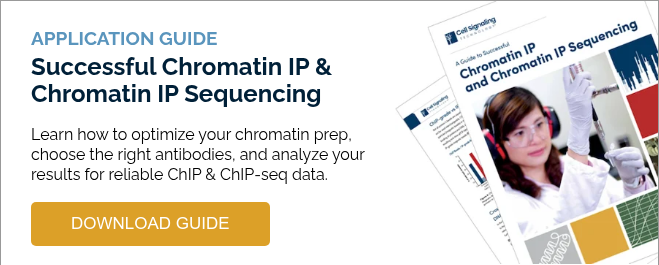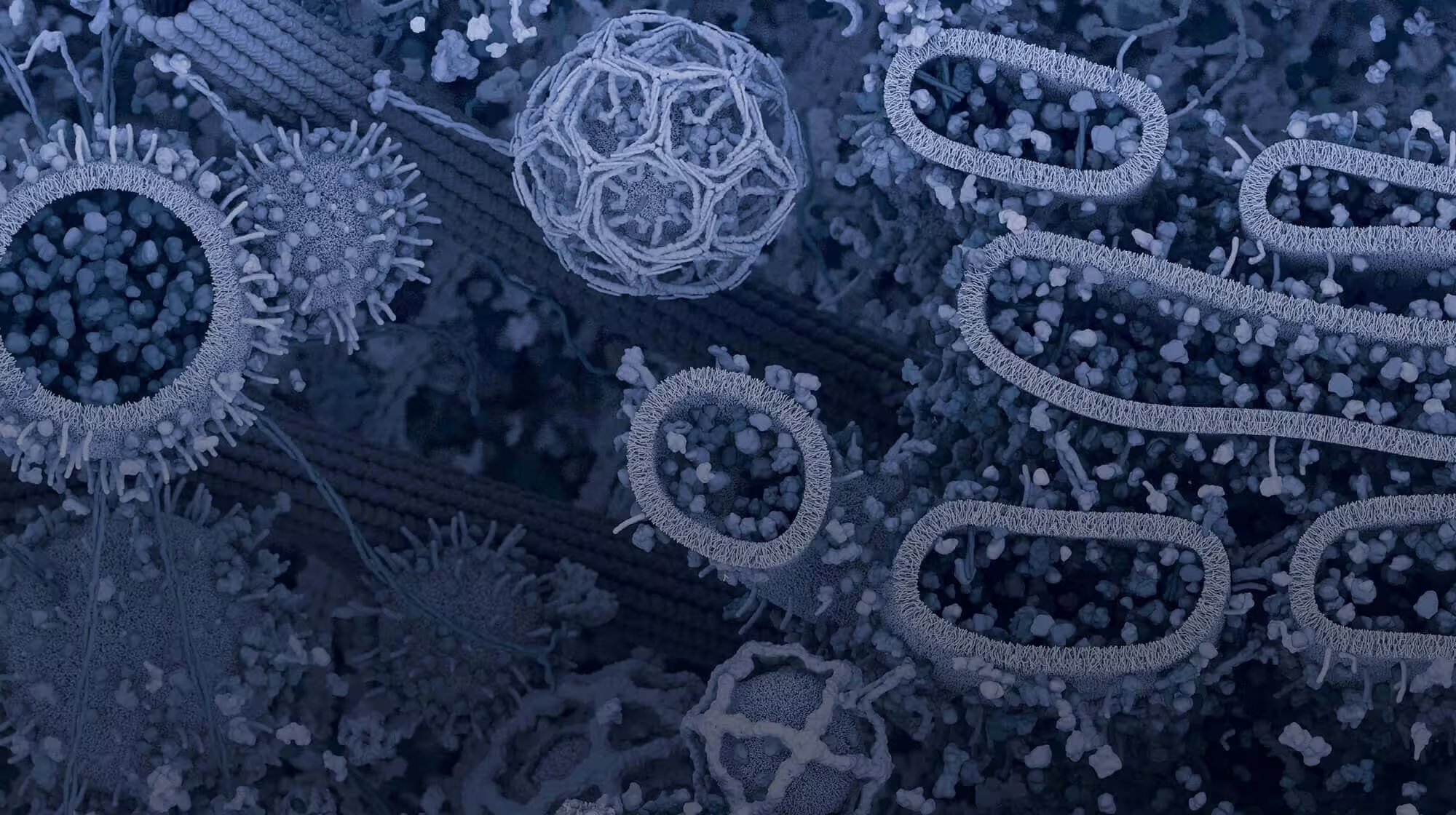Part one of this series described the importance of including proper controls in your ChIP protocols. Now, we will examine how chromatin preparation affects the final outcome of your chromatin immunoprecipitation (ChIP) experiment.
Choosing Between Enzymatic and Sonication Fragmentation for ChIP
ChIP is used to identify and characterize protein-DNA interactions in the context of chromatin. ChIP experiments can use varying input samples, chromatin fragmentation methods, and provide ChIP-qPCR or ChIP-seq readouts.
When choosing a chromatin shearing method, first, consider the type of interaction you are trying to detect:
- High-frequency, very stable protein-DNA interactions like those between histones and DNA, occur frequently enough that they may still be detected even if the protocol is not fully optimized.
- Low-frequency, less stable interactions like the binding of polycomb group proteins to specific genes (e.g., Ezh2), may fall under the detection threshold if the protocol fails to safeguard the integrity of the protein and the DNA, or if it relies on an antibody that is not highly specific to the target of interest.
Now it's time to consider your options for preparing your chromatin...
Comparing Chromatin Preparation Methods
Many labs rely on sonication to prepare their chromatin for immunoprecipitation. While effective, sonication requires exposing the chromatin to harsh, denaturing conditions (i.e., high heat and detergent) that can damage both antibody epitopes and the genomic DNA. Sonication can also be inconsistent -- the method and quality of the prep will vary depending on the type and brand of sonicator you are using and on the condition of the sonicator probe used. Finally, there may only be a few seconds difference between having chromatin that is under- or over-processed. As a result, chromatin preparations of consistent fragment size are difficult to generate with this method.
In contrast, enzymatic digestion uses a micrococcal nuclease, which cuts the linker region between nucleosomes to gently fragment the chromatin into an array of uniform pieces. Enzymatic digestions do not require high heat or detergents and provide consistent results if the recommended enzyme-to-cell number ratio is used. Thus, enzymatic digestion is simple to control, protects antibody epitopes and DNA from shearing or denaturation, and results in a consistent, high-quality chromatin preparation that is conducive to immunoprecipitation.
Chromatin was cross-linked and then fragmented with micrococcal nuclease (CST-enzymatic; blue track), CST sonication buffer (red track) or traditional sonication buffer (green track) and immunoprecipitated using the indicated antibodies. DNA was prepared for sequencing as outlined in the protocol for the SimpleChIP® Plus Enzymatic Chromatin IP Kit (Magnetic Beads) #9005.
Explore ChIP Protocols and chromatin fragmentation solutions from CST.
In the video below, we walk through four questions that will help you find a protocol and the ideal ChIP kit from CST that’s suited to your experimental needs. First, what is your input sample type, cells or tissues? Second, what type of protein is being targeted for IP? Histones, transcription factors, and cofactors bind to DNA with varying strength, affecting ChIP efficiency.
Other factors to consider are the abundance of the target protein in your sample, and your preferred method for chromatin fragmentation. We’ll also introduce some scenarios in which one method for chromatin fragmentation outperforms the other.
Experimental Data: Enzymatic Digestion for Better ChIP Results
The experiment shown below was performed using the SimpleChIP® Plus Enzymatic Chromatin IP Kit (Magnetic Beads) #9005 and another company’s sonication-based kit. Chromatin was first prepared using either enzymatic digestion (according to the SimpleChIP kit instructions) or sonication (according to the other company’s instructions). The chromatin was subjected to immunoprecipitation with the indicated panel of antibodies using immunoprecipitation reagents from either the SimpleChIP kit or the other company’s kit. Next, the immunoprecipitated DNA was quantified using real-time PCR and is presented below as a percentage of the total input chromatin.
The enzyme-digested chromatin showed more robust enrichment of target DNA loci than sonicated chromatin, using either the other company’s IP kit or the SimpleChIP® kit, as shown in Figure 1. This was especially apparent when less stable interactions; such as the binding of polycomb group proteins (Ezh2 or SUZ12) to specific genes were assayed.
 Figure 1. Target DNA loci are better immunoprecipitated from enzyme-digested chromatin than from sonicated chromatin.
Figure 1. Target DNA loci are better immunoprecipitated from enzyme-digested chromatin than from sonicated chromatin.
Overall, the CST SimpleChIP kits for sonication or enzymatic digestion work as well as traditional sonication for assessing histones, and both outperform traditional sonication when assessing transcription factors or cofactors.
Additional data comparing the performance of CST sonication and enzymatic digestions using SimpleChIP kits are shown in Figure 2 below.
 Figure 2: Chromatin was cross-linked and then fragmented with micrococcal nuclease (CST-enzymatic; blue track), CST sonication buffer (red track) or traditional sonication buffer (green track) and immunoprecipitated using the indicated antibodies. DNA was prepared for sequencing as outlined in the protocol for the SimpleChIP® Plus Enzymatic Chromatin IP Kit (Magnetic Beads) #9005.
Figure 2: Chromatin was cross-linked and then fragmented with micrococcal nuclease (CST-enzymatic; blue track), CST sonication buffer (red track) or traditional sonication buffer (green track) and immunoprecipitated using the indicated antibodies. DNA was prepared for sequencing as outlined in the protocol for the SimpleChIP® Plus Enzymatic Chromatin IP Kit (Magnetic Beads) #9005.
Explore CST kits & reagents for ChIP and ChIP-seq:
Additional Resources
Read our blog series on successful ChIP and ChIP-seq:
- Take Control: How to Use Positive and Negative Controls for Better ChIP Results
- Signal vs Noise: Choosing the Right Antibody for Successful ChIP
- From PCR to ChIP-seq: How to Analyze Your ChIP DNA
Check out our additional resources for chromatin profiling:
- SimpleChIP products
- View interactive CST signaling pathway diagrams for Epigenetics & Chromatin Profiling
- Download the Application Guide:







/42157_chimeric%20antibody%20blog%20featured3.webp)
